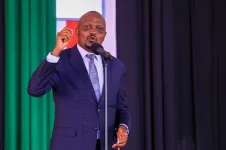Moses Kuria nailed it four years ago when he said Raila would team up with Ruto. This prediction became a reality last Friday when both leaders signed their agreement between ODM and UDA parties. They created this partnership to tackle Kenya's big problems next year.
Kuria spoke about this at a radio station before it happened. He shared a video on X showing his forecast that Raila would help the president achieve his goals. Kuria mentioned he'd back whatever decision the former Prime Minister made regarding working with Ruto.
"I predict Raila and Ruto will join forces, leaving some people hanging. This represents his final political move. Raila always stays close to where things happen - either opposing or supporting the government. He feels the nation's pulse. He understands Ruto holds an unbeatable position," Kuria explained during that interview.
Kuria added that Raila might logically ask for political space, offering assistance as an old friend and bringing his ideas forward—something Kuria personally encouraged. The new alliance followed several high-level meetings around Kenya led by Raila himself. He told supporters he remained ready to serve when needed.
After losing his African Union Commission chairmanship campaign in Ethiopia, Raila hinted he'd focus again on Kenyan politics. He promised to talk with many people before deciding his next steps. After that disappointment, he briefly visited Dubai, then returned home for secret talks with President Ruto at Mombasa State House.
Their agreement emphasized protest rights as constitutional freedoms all Kenyans deserve without interference. Both leaders promised money for people hurt during past demonstrations. The document called protest suppression "one of Kenya's most shameful realities" since independence.
The agreement states that these efforts must include holding law-breaking officers accountable and paying victims. According to their plan, police need better ways to handle demonstrations and public gatherings. They also want an urgent check into Kenya's loans—how much money came in and where it went.
Their document highlights the importance of gradually fixing Kenya's growing debt problem. They want clear rules to ensure proper oversight of future borrowing. This partnership marks a significant shift in Kenya's political landscape as former rivals unite to address national challenges.
Kuria spoke about this at a radio station before it happened. He shared a video on X showing his forecast that Raila would help the president achieve his goals. Kuria mentioned he'd back whatever decision the former Prime Minister made regarding working with Ruto.
"I predict Raila and Ruto will join forces, leaving some people hanging. This represents his final political move. Raila always stays close to where things happen - either opposing or supporting the government. He feels the nation's pulse. He understands Ruto holds an unbeatable position," Kuria explained during that interview.
Kuria added that Raila might logically ask for political space, offering assistance as an old friend and bringing his ideas forward—something Kuria personally encouraged. The new alliance followed several high-level meetings around Kenya led by Raila himself. He told supporters he remained ready to serve when needed.
After losing his African Union Commission chairmanship campaign in Ethiopia, Raila hinted he'd focus again on Kenyan politics. He promised to talk with many people before deciding his next steps. After that disappointment, he briefly visited Dubai, then returned home for secret talks with President Ruto at Mombasa State House.
Their agreement emphasized protest rights as constitutional freedoms all Kenyans deserve without interference. Both leaders promised money for people hurt during past demonstrations. The document called protest suppression "one of Kenya's most shameful realities" since independence.
The agreement states that these efforts must include holding law-breaking officers accountable and paying victims. According to their plan, police need better ways to handle demonstrations and public gatherings. They also want an urgent check into Kenya's loans—how much money came in and where it went.
Their document highlights the importance of gradually fixing Kenya's growing debt problem. They want clear rules to ensure proper oversight of future borrowing. This partnership marks a significant shift in Kenya's political landscape as former rivals unite to address national challenges.












